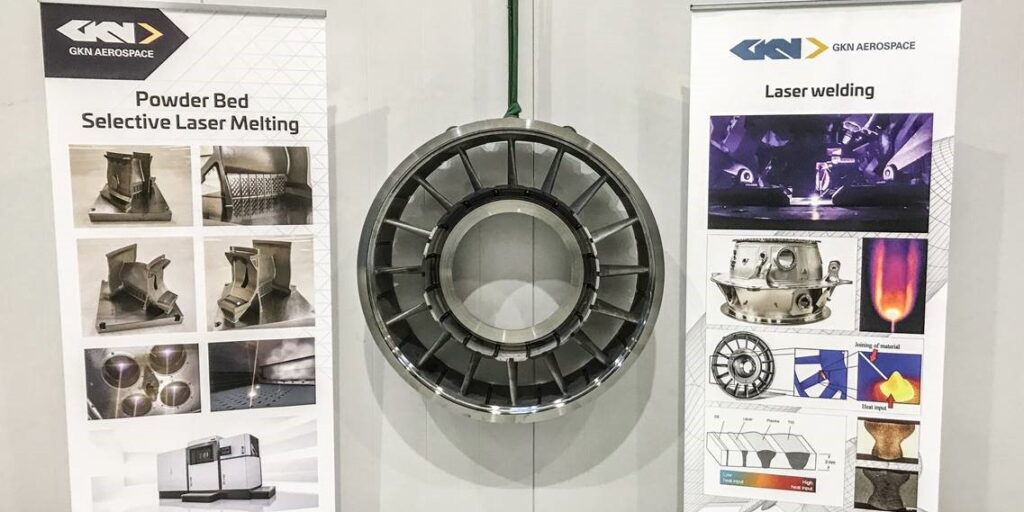
Engineers at GKN Aerospace’s facility in Sweden completed testing of a new concept of a lightweight Turbine Rear Structure (TRS). (GKN Aerospace)
GKN Aerospace, leading airframe supplier to commercial and military aviation OEMs, has successfully completed several urban air mobility (UAM) feasibility studies through leading a Skybus research project. In collaboration with Swanson Aviation Consultancy, Pascall+Watson, and Connected Places Catapult, the Skybus project explored a concept of a 30-person eVTOL aircraft that would not only reduce congestion in urban environments but would also aid in decarbonization.
The feasibility studies found that these aircraft, referred to as “air buses,” could carry out operations in the same airspace as air taxis in the future. In addition to determining opportunities for “air bus” operations, the Skybus consortium created a concept for a vertiport—along with economic models and demand forecasts—for a future UAM system based in London.
GKN Aerospace offers an extensive range of advanced aerospace systems and technologies. Just last week, the company announced that their team of engineers at the Global Technology Centre in Trollhättan, Sweden, completed testing of a new lightweight Turbine Rear Structure (TRS) concept. The TRS serves to manage flow from an engine’s low-pressure turbine and maximize the axial thrust, according to GKN, and it helps to improve the engine’s efficiency. The engineers utilized a novel metallic alloy that possessed higher temperature capability in designing and manufacturing the lightweight structure, and the team demonstrated a weight reduction potential of 14% with the TRS.

The TRS has the potential to achieve a 14% weight reduction and it improves engine efficiency. (Photo: GKN Aerospace)
The findings from the GKN Aerospace-led Skybus program’s research will provide guidelines for integrating mass-transit eVTOL aircraft to improve access to remote or difficult-to-access regions. According to the announcement from GKN Aerospace, “A successful zero emissions mass transit system in the air would also ease congestion on the road network, reducing overall travel time, cost and emissions for all travelers.”
Skybus was started as a research initiative in January 2021 as part of the Future Flight Challenge that provides funding for development of sustainable aviation solutions. Neuron, an aviation technology company, also recently began a series of trials as participants in the Future Flight challenge. Neuron’s aim is to demonstrate aspects of future flight and advanced air mobility for both unmanned aircraft and eVTOLs. The current focus of the Future Flight challenge is developing integrated aviation systems for new classes of eVTOLs or drones.

GKN Aerospace collaborated with Swanson Aviation Consultancy, Pascall+Watson, and Connected Places Catapult to complete feasibility studies of a 30-person eVTOL aircraft concept for urban air mobility (UAM). (GKN Aerospace)
Gary Cutts, Director of the Future Flight Challenge at UK Research and Innovation, commented: “The Future Flight Challenge has always taken a broad view of the opportunities provided by the many different types of novel clean aircraft emerging. Our market studies show a real potential for a substantial distributed aviation system using the types of aircraft concept envisaged by the Skybus consortium and we welcome the system-wide insights gained from their feasibility studies.”
GKN Aerospace has partnered with multiple companies based on its significant expertise in manufacturing critical aerospace subsystems. In September 2021, GKN Aerospace was selected to design and manufacture the wing and electrical vertical wiring interconnection systems for the VA-X4 eVTOL from Vertical Aerospace. Earlier in 2021, the airframe supplier was chosen by General Atomics Aeronautical Systems to manufacture advanced composite V-tails for the MQ-9B SkyGuardian Remotely Piloted Aircraft System.